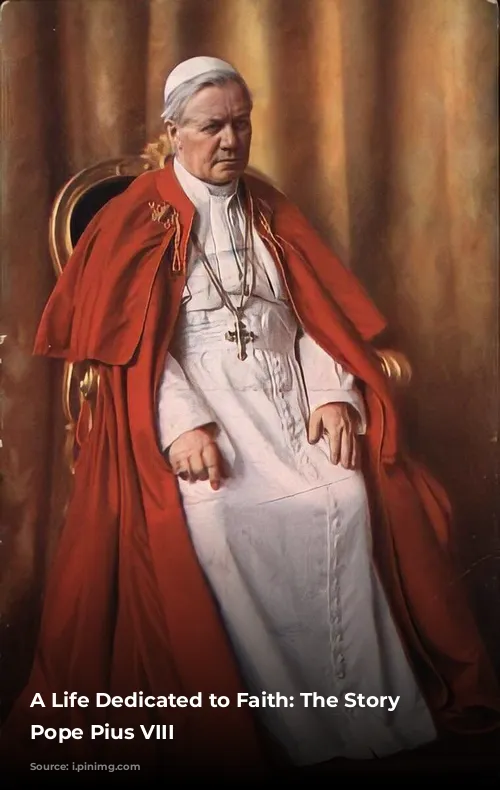The early life and rise of Pope Pius VIII
Pope Pius VIII, born Francesco Saverio Castiglioni, was a man of immense faith and unwavering dedication to the Church. His journey to the papacy began in Cingoli, Italy, on November 20, 1761. After completing his studies in Osimo, Montalto, and Bologna, Castiglioni pursued further theological training in Rome. His commitment to the Church was recognized by Pope Pius VII, who appointed him Bishop of Montalto in 1800. Despite being removed from his diocese by Napoleon in 1808, Castiglioni returned in 1814, where he was elevated to the esteemed position of Cardinal in 1816. His dedication to his calling was further solidified when he was transferred to the see of Cesena, and later called to Rome by Pius VII, where he was appointed Grand Penitentiary of the Church and Bishop of Frascati.
A Conciliatory Pope in a Time of Change
The year 1829 marked a pivotal moment in Castiglioni’s life. He was elected Pope on March 31, taking the name Pius VIII. Though steadfast in protecting the Church’s rights, Pius VIII demonstrated a conciliatory approach to political matters. This was evident in his prompt recognition of Louis Philippe as King of the French in the wake of the July Revolution of 1830. However, despite his strength and resolve, Pius VIII’s reign was tragically cut short by illness. He passed away on November 30, 1830, at the age of 69.
A Pope and His Advocate: The Story of Pius VIII and Father de Mazenod
Father de Mazenod’s Plea for Recognition
The story of Pius VIII intertwines with the life of Father Eugene de Mazenod, founder of the Oblates of Mary Immaculate. In 1826, Father de Mazenod, seeking recognition for his new religious order, made several visits to Cardinal Castiglioni, who at the time was the Grand Penitentiary of the Church. While Castiglioni received de Mazenod courteously, he initially voiced reservations about approving the Oblates’ Rule. Father de Mazenod’s anxieties were heightened by the knowledge that Bishop Arbaud had expressed opposition to the Rule in a letter to the Pope. Despite this, the Cardinal, after meeting with the Pope, ultimately became a strong advocate for the Oblates’ cause. His support was further demonstrated by a visit to Bishop Marchetti, to whom he enthusiastically recommended the Oblates.
The Pope’s Influence on the Oblates
Following the election of Pius VIII, Father de Mazenod, seeking to express his gratitude and loyalty to the new Pope, requested a jubilee celebration. He also expressed his desire for confirmation of the Order’s Rule by writing to the Pope, seeking his blessing and recognition. In turn, Pius VIII responded positively to these requests, confirming the Oblates’ position within the Church. Father de Mazenod, in a letter to Father Tempier, urged his community to respect the Pope’s decision on Louis Philippe’s recognition, emphasizing the importance of consistency and trust in the Church’s authority.
Pius VIII’s Legacy and the Oblates
Throughout their interactions, the relationship between Pius VIII and Father de Mazenod highlights a shared commitment to faith and the Church’s mission. While Pius VIII’s reign was tragically brief, his legacy lives on through his influence on the Oblates. His support for Father de Mazenod’s work ensured the continued growth and flourishing of the Order, leaving an enduring mark on the Catholic Church.
